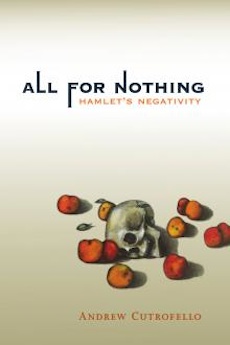By David Partenheimer
All for Nothing is a reception study of Hamlet. As such, Cutrofello compiles an impressive list of philosophers, psychologists, and social theorists, who mention Hamlet in their writings regarding “negativity.” Cutrofello is able to catch many prominent names in his net because he defines negativity broadly: will-negating mood, activity of dissolution, via negativa, negative capability, nihilism, melancholy, negative faith, tarrying, nonexistence, pessimism, determinate negation, and the adverbs “not” and “never.”
Moreover, Cutrofello makes connections that do not even exist. For example, he conflates Descartes’ “I think, therefore I am” with Hamlet’s “To be or not to be?” Since both statements deal with existence, Cutrofello spends nearly an entire chapter arguing how Descartes and Shakespeare must be philosophical Siamese twins, as if a chair and a table were identical because they are both furniture. In order to make a (debatable) point, Cutrofello subjects Hamlet and Descartes to a partner procrustean treatment. In this example of Descartes, Cutrofello’s objective is to prove that Hamlet inspired Descartes’ cogito ergo sum. His arguments strike me as an infinite regression. Cutrofello is trying too hard to meet the mandate of the series, edited by Slavoj Žižek, dedicated to using Lacanian psychoanalysis to find a “short circuit” and disturb a reader’s perceptions about a work she thinks she knows well. Shock and awe is a questionable objective for an MIT Press publication.
Despite the subtitle, Hamlet’s Negativity, Hamlet is a minor character in the book. Cutrofello invites his reader to imagine Hamlet on stage with a cast of intellectual stars who comment on Hamlet from their perspectives, much like characters in Stoppard’s absurdist drama, Rosencrantz and Guildenstern are Dead. Hamlet’s cameo appearances serve as an opportunity for the cast to say, “I know Hamlet,” then talk about themselves and their ideas. If Hamlet were cut from the cast, the book would read the same because it is a historical summary of the views of such intellectual stars as Descartes, Kant, Hegel, Schopenhauer, Marx, Kierkegaard, Nietzsche, Freud, Russell, and Heidegger. Moreover, the book is a collage, patched together from Cutrofello’s vast and impressive personal reading list. It reads like a Wikipedia article with profuse hyperlinks, leading to other articles with even more hyperlinks, until a weary reader ends up at an abstruse destination about a possible link between Hamlet and Kant’s failed love life.
All for Nothing contributes little to Hamlet scholarship. However, it is a tour de force as a montage of literary, philosophical, and psychological works embellished with exhaustive documentation. In one paragraph, Cutrofello’s takes us from Sophocles’ Oedipus at Colonus to Nietzsche, King Midas, Dionysian truth, Apollonian culture, the Homeric man, Euripides, Socrates, and Wagner along with seven lengthy notes in order to make his point that Hamlet looked into the abyss. All this occurs on the first page of the first chapter, “Hamlet’s Melancholy.” You can imagine the “download” for the next 200 pages. Despite my awe for Cutrofello’s encyclopedic mind, I entertain the possibility that All for Nothing is a postmodern hoax.
David Partenheimer (ΦBK, University of Utah, 1971) is a professor of English at Truman State University and a resident member of the Delta of Missouri chapter of Phi Beta Kappa.




